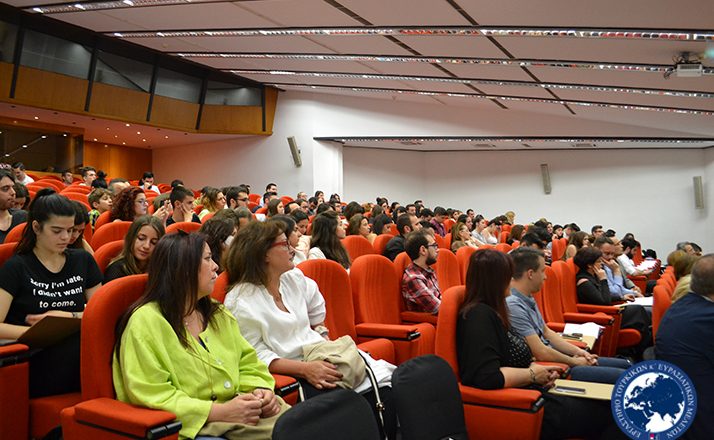2nd Colloquium of Turkish & Eurasian Studies
«Erdogan’s Turkey. Strategic goals before regional realignments»
University of Piraeus, 5th of May, 2017.

On May 5th 2017 an informative scientific colloquium took place in the University of Piraeus under the topic of «Erdogan’s Turkey. Strategic goals before regional realignments».
The event consisted of five sessions as well as a round table discussion. The speakers were both esteemed professors and junior researchers of the Turkish and Eurasian Studies Laboratory of the University of Piraeus.

The colloquium’s keynote speaker was Ambassador (ret.) G. Gennimatas, General Secretary of the Presidency of the Hellenic Republic, with his speech “Erdogan’s Turkey. In quest of a role (2002-2017)”. The conference was attended by professors, students and the public.

In the first session entitled “Neo-Ottomanism and the Turkish Political System in the post-Coup d’état attempt era” speakers focused on the ongoing adjustments of the Turkish political system in the aftermath of the events of the 15th of July 2016. At first, the efforts to deconstruct the Kemalist state were scrutinized under the question of whether the aforementioned might constitute the ‘revenge’ of the Islamic faction. Moreover, the blow to the freedom of speech and the intelligentsia after the Coup attempt was examined, while focusing on the internal realignments, as well as the international extensions. Researchers also addressed the The Justice and Development Party (J.D.P.) and its policy change towards Kurds, while posing a question on if the aforementioned may simply be an effort to concentrate power. The session was completed with the examination of the “civil war” between domestic Islamic political forces, referring to the tensions between the J.D.P. and the Gülen society, as well as the preservation of the power of the Turkish government and more specifically President R.T. Erdogan.

The second session entitled “Turkish Strategy and Regional Alliances: Exiting isolation”, examined current matters of foreign affairs of the Turkish state. Initially, the Turkish-Israeli rapprochement effort was examined as a case of difficult reconciliation. Following, the rapprochement of Russia by Turkey was discussed, while finding that it likely constitutes a means of avoiding the cost of isolation. The panel continued with the E.U.-Turkey relations and examined whether the threats of Turkish stakeholders to adhere to the Shanghai Cooperation Organization -instead of the E.U.- are viable or are simply part of a misleading alliance of Ankara. Finally, the western pressures and Turkish offensive against the ‘Islamic State’ were examined.

The second session was followed by an academic round table discussion concerning the “Strategic Realignments in the Middle East and Turkey after the Referendum”. The panel which consisted of professors of Panteion University, the University of Peloponnese as well as the University of Piraeus, took a closer look on the aftermath of the referendum held on the 16th of April and the reforms that were imminent due to the outcome, in both Turkey and the Middle East.

The third session entitled “Regional Crisis & Conflicts and Turkey” examined the the renewed balance and the position of R. T. Erdogan’s Turkey facing the crisis and unrest in its neighboring regions. Firstly, the Iranian Foreign Policy during Syrian Crisis and their competition with Ankara were discussed. Moving on, the panel shed light on the Middle Eastern Policy of Egypt, while examining their relations with Turkey and Russia. During the session the mater of the Neo-Ottoman expansionism in the Middle East was also discussed with regards to the intervention of Turkey in Northern Syria and the Kurds. Lastly, the Armenian-Azeri Crisis of 2016 was examined with a focus on the pivotal role of Russia and Turkey on the matter.

The fourth session of the colloquium entitled “International Economic & Energy Relations: Turkey and Caucasus”, touched upon vital economic and energy matters in Turkey and its surrounding region. At first, the diplomatic and economic relations between Turkey and Iran, both before and after the lift of the international economic sanctions, were discussed. Following, the “Policy of Closed Borders” was examined with focus on the case of Armenia and Turkey and the consequences and complications in the sub-system of Caucasus. The panel concluded with a presentation regarding the Turkish stream and the energy dimension of the Russian-Turkish relations.

The fifth and last session entitled “Turkish Strategy & Diplomacy in the Eastern Mediterranean”, consisted of presentations concerning the current Turkish affairs in the aforementioned region. In the beginning, researchers examined the Cyprus Issue and the guarantees system in place as well as the goals of Ankara on the matter. The panel continued by viewing education as a vehicle for achieving foreign policy objectives by Turkey, whilst examining the case of the pseudo state, Turkey and the O.I.C.. Lastly, the relation between the defense industry and grand strategy in the case of Turkey, were scrutinized.
Tourkomichali Christina-Anthi
Head of PR Unit, TES Lab.

